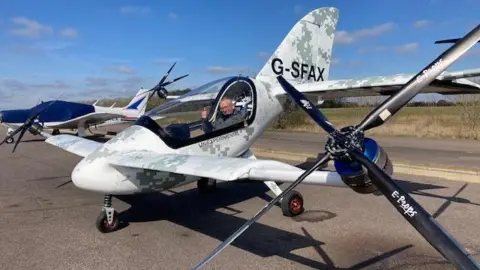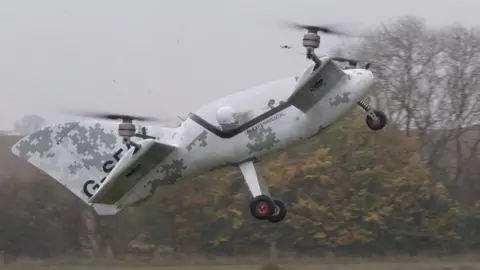An electric drone where you can sit

 BBC
BBCThink of an electric drone mixed with a fixed-wing plane-this is the concept behind a new two-person aircraft developed by the starting company Skyfly.
The ax promises the flexibility of a helicopter, but without cost, noise pollution or carbon emissions.
It is a vertically talented aircraft or electric vertical start and landing (evtol) plane, which means that it can come out like a helicopter.
There are also two fixed wings that allow him to get out and descend from a track.
The company claims that the ax has a maximum speed of 100Mph, up to 172kg – the weight of about two 13.5st adults – and has a range of 100 miles about the distance from Oxford to Wight Island.

Located near Banbury in Oxfordshire, the team took five years to fine adjust the design.
Skyfly’s Technical Engineer Dr. “Compared to a traditional aircraft, there are eight strange engines,” Bill Brooks says.
DR BROOKS, “And this is the tail on the front. “
Security is also an important part of design.
‘Environmental Benefits’
Large wings help to slide in case of power outage, and at the end of each wing, there are two engines, so that one fails, the other can compensate.
It is also equipped with an emergency ballistic parachute to safely down the plane and passengers.
In addition to being safer and cleaner than traditional aircraft, Michael Thompson, General Manager of Skyfly, says electric models are much quieter.
“When you get out, you don’t bother everyone around you from the perspective of noise, so I think electricity provocation is not only in terms of environmental benefits, but also for noise pollution,” he says.

Who is marketing?
Among those who want to provide electric flying swap service among other developed EVTOLs Bristol -based vertical aviation (VA) .
VA and Archer and Joby in the US are designing electric planes to carry four passengers.
Skyfly’s ax is more compact compared and is directed to the private market.
The Do-Zouself Kit-release comes with a price tag of £ 250,000.
It is for existing pilots who want to get away from diesel piston engines.
Jason Pritchard, editor -in -chief of Evtol Insights, says that it is likely to appeal to flying clubs to train new members:
“The Evtol aircraft industry is still in infancy with the first operations a few years away, but in the coming years, he needs to train many pilots,” he says.
“Also, AX’s design can train pilots with the necessary skills and controls to reduce them to a weak plane, which is a necessary tool.”
 Sky
SkyHow about the infrastructure charge?
While the ax can be charged with a traditional three -pin receipt during the night, just like home cars, the charging infrastructure of electric aircraft will need to be scaled.
West Sussex -based Aerovolt has installed fast charger on seven UK airports and 40 more on the pipeline.
Founder Philip Kingsley-Dobson says that demand has increased.
“Many piston planes cannot use bullet fuel in the future, so they are looking for alternatives and ways to remove the lower end of aviation from carbon.”
‘Cutting edge’
There is currently no evtol plane that is allowed to fly in the UK.
Skyfly’s AX has successfully completed manned test flights both in the air and advanced flight modes, but it still needs to be certified by Civil Aviation Authority (CAA).
With 40 pre -orders from buyers all over the world, the company hopes to deliver the new model to customers at the beginning of next year.
A CAA spokesman said: “We are working with innovators to test and fly brand new aviation forms that keep the UK at the last point of flight technology and support the growth of the sector.
“New technology comes with new challenges and security continues to be our priority in all these studies.”





